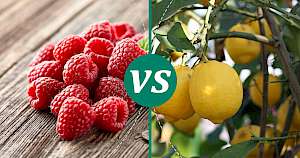Lemon vs Raspberry: Nutrition, Calories & Protein Compared


Lemon vs Raspberry
Nutrition Facts
Serving size:
change
5g10g15g20g30g40g50g60g80g100g120g140g160g180g200g220g250g300g350g400g450g500g600g700g800g900g1000g
1oz2oz3oz4oz5oz6oz7oz8oz10oz12oz15oz20oz25oz30oz35oz40oz50oz
Amount Per Serving:
Serving size:
change
5g10g15g20g30g40g50g60g80g100g120g140g160g180g200g220g250g300g350g400g450g500g600g700g800g900g1000g
1oz2oz3oz4oz5oz6oz7oz8oz10oz12oz15oz20oz25oz30oz35oz40oz50oz
Amount Per Serving:
Lemon vs Raspberry 100g Compare
| per 100g | Lemon | Raspberry |
|---|---|---|
| Calories | 29 | 52 |
| Carbohydrates | 9.32 g | 11.94 g |
| Fat | 0.3 g | 0.65 g |
| Dietary fiber | 2.8 g | 6.5 g |
| Protein | 1.1 g | 1.2 g |
| Calcium | 26 mg | 25 mg |
| Iron | 0.6 mg | 0.69 mg |
| Magnessium | 8 mg | 22 mg |
| Potassium | 138 mg | 151 mg |
| Sodium | 2 mg | 1 mg |
| Vitaminium A | 22 µg | 33 µg |
| Vitaminium B2 (riboflavin) | 0.02 mg | 0.038 mg |
| Vitaminium B3 (Niacin) | 0.1 mg | 0.598 mg |
| Vitaminium B6 | 0.08 mg | 0.055 mg |
| Vitaminium B9 (Folic acid) | 0.011 mg | 21 mg |
| Vitaminium C | 53 mg | 26.2 mg |
| Vitaminium E | 0.15 mg | 1.42 mg |
| Beta karoten | 1 mg | 16 mg |
Exploring the Colorful World of Lemons and Raspberries
When it comes to adding a burst of flavor and a punch of color to our plates, lemons and raspberries stand out in the fruit world. Each brings its own unique set of benefits and flavors to the table, making them favorites among culinary enthusiasts and health-conscious eaters alike. But beyond their taste and nutritional value, lemons and raspberries are rich in history and versatility. Did you know that lemons have been used not just as food but also in medicine and as a symbol of high social status in ancient cultures? Or that raspberries aren't just red but can be found in a rainbow of colors including black, purple, and golden?
A Close Look at Lemons and Raspberries
When comparing lemons to raspberries, it's fascinating to see how these fruits stack up against each other in terms of calories, nutrition, and health benefits. While both fruits are low in calories, making them great choices for those watching their weight, they each offer a unique nutritional profile that can complement a healthy diet.
- Calories: Lemons come in at a mere 29 calories per 100 grams, while raspberries have slightly more, with 52 calories for the same serving size.
- Carbohydrates and Fiber: Raspberries edge out lemons with 11.94 grams of carbohydrates and an impressive 6.5 grams of fiber, compared to lemons' 9.32 grams of carbohydrates and 2.8 grams of fiber. This high fiber content makes raspberries an excellent choice for digestive health.
- Fats and Proteins: Both fruits are low in fat but raspberries have a slight lead in protein content with 1.2 grams per 100 grams, compared to lemons' 1.1 grams.
- Vitamins and Minerals: Lemons are well-known for their vitamin C content, boasting 53 mg per 100 grams, while raspberries offer 26.2 mg. However, raspberries are superior in terms of vitamin E and K, as well as magnesium and zinc, making them a powerful fruit for overall health.
Health Benefits Galore
Both lemons and raspberries offer an array of health benefits. Lemons are celebrated for their ability to aid in digestion, boost the immune system, and even help in skin care, thanks to their high vitamin C content. Raspberries, on the other hand, are rich in antioxidants, which can help fight inflammation and reduce the risk of chronic diseases. Their high fiber content also makes them beneficial for heart health and maintaining a healthy weight.
Adding Lemons and Raspberries to Your Diet
Incorporating these fruits into your diet is not only a treat for your taste buds but also a boost for your health. Lemons can easily be added to your water for a refreshing twist, used in dressings, or as a flavor enhancer in a variety of dishes. Raspberries are perfect for snacking, adding to oatmeal or yogurt, or blending into smoothies. The possibilities are endless!
In conclusion, while lemons and raspberries may differ in their nutritional profiles, they both offer substantial health benefits and are versatile additions to any diet. Whether you're squeezing a lemon over your salad or snacking on a handful of fresh raspberries, you're doing your body a favor. So, why not enjoy both and reap the array of benefits these fruits have to offer?
Lemon 100g
29kcalCalories source
- 84% CARBS.
- 10% PROTEIN
- 6% FAT
Raspberry 100g
52kcalCalories source
- 82% CARBS
- 8% PROTEIN
- 10% FAT
Compares of lemon
- Lemon vs Apple
- Lemon vs Apricot
- Lemon vs Avocado
- Lemon vs Banana
- Lemon vs Melon
- Lemon vs Cherries
- see all compares of lemon
Marcin Piotrowicz
calories-info.com creator
Healthy diet and healthy lifestyle promoter
Add comment